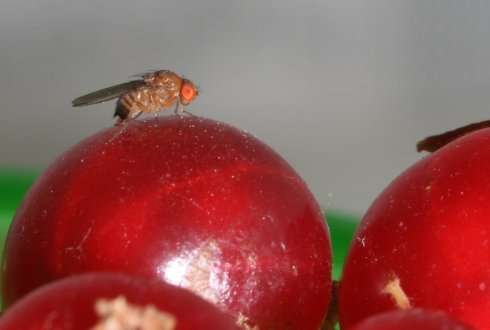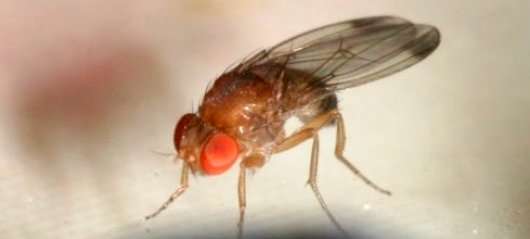Stop fruit flies by removing rotten fruit

Three years after they were first detected, the number of spotted-wing drosophila fruit flies in the Netherlands has exploded. "There are still ways to combat the harmful Drosophila suzukii in soft fruit," says Herman Helsen, fruit entomologist at Wageningen UR. "Farmers of fast-ripening soft fruit, such as strawberries and raspberries, have several ways to control the problem."
Wild source
The first fruit flies with red eyes and a dark spot at the top of their wings were spotted in the Netherlands in 2012. Since then their numbers have multiplied year by year. "We closely follow how wild host plants are being affected in various landscapes to see, for instance, to what extent wild blackberries can be a source of contamination for fruit farms," Helsen explains. "Additionally we are following the infestation levels at the farms. Various cherry farmers found their late-harvest fruits 100% affected over the past year, making their fruit unmarketable."
Remove all fruit
Despite the rapid rise of the harmful fruit fly there are definitely ways of preventing damage. The first is proper hygiene, says Helsen. "In fast ripening soft fruit like strawberries, the larvae will not have hatched by the time the fruit is picked. Only by leaving rotting or damaged fruit underneath the plant will larvae be able to develop into the next generation of fruit flies. The message I am trying to convey is to pick or collect the bad fruit as well. Don't leave anything on the soil."
Netting
Cherry fruit on the contrary, ripens long enough for the larvae to develop. "A solution here could be netting with fine one-millimetre mesh. This type of netting is, of course, expensive, vulnerable to wind and cancels out part of the sunlight. Ongoing research should show whether the investment is worth it."

Chemical pesticides sometimes necessary
Once a major infestation of the fruit occurs, chemical pesticides remain the only efficient weapon. "Unfortunately there have been no major breakthroughs in the field of bio-pesticides to date," continues Helsen. "In the international research project DROPSA we are working on experiments with biological agents, such as fungi and nematodes. This may offer a solution for the treatment of, say, blueberries, where part of the fruit is left beneath the plant inevitably. Bio-pesticides could prevent the left behind fruit from becoming a source of contamination."
Toolbox
Despite the increasing problems, Helsen is convinced that it will eventually become possible to again cultivate soft fruit in the Netherlands without worries. "Hygiene and chemistry are currently the two main weapons, but we will gradually be able to fill our tool box with more and better instruments to control these harmful insects."
Provided by Wageningen University
















